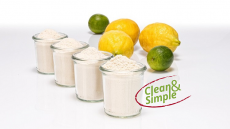Food gums show potential as teeth protectors
The food gums could form a protective coating on the enamel surface of teeth, thereby protecting them from the dissolution and softening of enamel, according to findings published in Dental Materials.
Soft drink manufacturers are already looking at various options to reduce the enamel-eroding action of their products, according to the German researchers, with additives such as citrate and fluoride, saliva proteins and milk-proteins being investigated.
The lab-based in vitro study, which used a citric acid solutions modified with the food polymers, indicated that pectin and propylene glycol alginate also have potential in this area.
“To our best knowledge, the present study is the first using highly esterified pectin (HP) and propylene glycol alginate (PGA), as erosion inhibitors,” state the researchers, led by Klaus Jandt from Institute of Materials Science and Technology (IMT) at the Friedrich-Schiller-University in Jena.
Study details
Professor Jandt and his co-workers prepared citric acid solutions modified with the food-approved polymers at a level of 1 per cent. The solutions were made to varying acidity levels, including pH 2.3, 3.3, and 4.0.
Using enamel from human molars, the researchers tested the hardness of the enamel after soaking in the citric acid solution, and the polymer-modified solutions. The results showed that the gum arabic and the PGA protected the enamel, with “statistically significantly higher nanohardness compared to samples treated with [the control citric acid solution],” said the researchers.
On the other hand, no significant benefits were observed when pectin was used.
How and what next?
Commenting on the potential mechanism, the authors note that the polymers appeared to produce a “shielding effect” by “forming a protective layer on enamel gives the opportunity to develop new food applications against human dental erosion.
“Moreover, our results identify different suitable polymers for reduced enamel erosion dependent on the given pH value of soft drinks or other food. The reduced enamel erosion may be caused by polymer layers.
“In future a potential formation of polymer layers on enamel to reduce erosion needs to be studied in in situ experiments and using native and unpolished enamel,” they concluded.
Source: Dental Materials
Volume 26, Pages 831-839, doi: 10.1016/j.dental.2010.04.008
“Pectin, alginate and gum arabic polymers reduce citric acid erosion effects on human enamel”
Authors: M. Beyera, J. Reicherta, E. Heuricha, K.D. Jandta, B.W. Siguschb
























